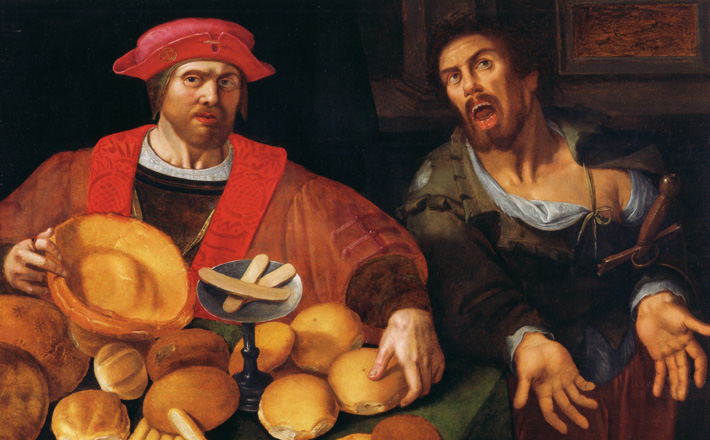Commentary on Amos 8:4-7
The old truism that “pride goes before the fall” (Proverbs 16:18) is, at least for Amos, gospel truth.
God’s chosen people have become consumed by their pride and, echoing Micah 6, Amos condemns the unjust practices of a people who have lost their way.
In verses 5-7 Amos puts words in the mouths of those he is condemning, characterizing them through this rhetorical device as a foolish, unjust, callous people who have rejected God’s Law (see Amos 2:4). Amos makes the target of his critique condemn themselves with their own outrageous words:
- “When will worship be over, so that we can get back to work?”
- “Let’s charge higher interest rates, and levy ‘membership’ fees on credit recovery offers.”
- “We can charge double or triple if we call our product ‘new,’ or ‘organic,’ or ‘local.’”
- “The poor will never see it for what it really is.”
These quotations are the rhetorical equivalent of the handlebar-mustached villain wringing his hands eagerly in the shadows. It’s obvious, over the top, and remarkably pointed in its critique of God’s people.
This language of making the ephah (about the same as a bushel) small, and the shekel (about half an ounce of silver), of commoditizing human lives (buying the poor for silver and the needy for footwear), is familiar in the prophets (again, see Micah). The general disregard for and exploitation of the poor is summarized as Amos accuses the people of stooping to selling even the “sweepings of the wheat.”
To modern readers this may seem like a minor, even mysterious point, but it is central not only to the biblical law (see Leviticus 19:9-10: “When you reap the harvest of your land, you shall not reap to the very edges of your field, or gather the gleanings of your harvest. You shall not strip your vineyard bare, or gather the fallen grapes of your vineyard; you shall leave them for the poor and the alien: I am the Lord your God.”), and to biblical stories (see the book of Ruth). Israel’s care for the poor goes beyond refraining from exploiting them; it includes taking care of them at the most basic level.
This point may well be the most controversial and pointed for our modern setting, both in terms of business practice (both at home and abroad), and our personal lives. The simplest move (perhaps) is to allegory, asking how we are taking the “sweeping of grain” in our own lives, of resources yes, but also time, temperament, talent, and so on, and “selling them,” instead of blessing God’s people through them.
One brief aside — there is a striking allegorical use of “sweepings” in Isaiah 17:4-6, which may be worth highlighting here:
On that day
the glory of Jacob will be brought low,
and the fat of his flesh will grow lean.
5 And it shall be as when reapers gather standing grain
and their arms harvest the ears,
and as when one gleans the ears of grain
in the Valley of Rephaim.
6 Gleanings will be left in it,
as when an olive tree is beaten—
two or three berries
in the top of the highest bough,
four or five
on the branches of a fruit tree,
says the Lord God of Israel.
Notice that the “sweepings” here are not of wheat, but of God’s people. Even as God’s people are punished for their sin, the promise is made that, while Israel may have sold even the sweepings of the wheat, God will not destroy this people completely; there will be a remnant preserved, “gleanings” that will remain and be spared.
The exploitation of the poor and the question of proper worship are central to the message of the eighth-century prophets. And in Amos 8 we get a final beautiful (if brutal) rhetorical move by the prophet, one that is distinctive. Amos points to the “pride of Jacob” as the object of God’s memory, and God’s judgment. The “pride of Jacob” is used here in a striking way. Elsewhere, this phrase refers to the Promised Land (see Psalm 47:4). Here, the judgment of the land (primarily the Northern kingdom, but Judah as well, as in Amos 2) is tied up in the pride (ga’on in Hebrew) of Israel. They are arrogant, detached from their fellow human beings, and disinterested in God’s Law. Pride is not necessarily evil in and of itself, but it is most often used in the Old Testament and the prophets in particular to describe Israel’s sin (see Ezekiel 16:49; Jeremiah 13:9; Isaiah 13:11).
It may well be, that for the church in this present age, there is no more disturbing, no more telling, and no more accurate warning than this from the prophet Amos:
The Lord has sworn by the pride of Jacob:
Surely I will never forget any of their deeds.


September 22, 2013